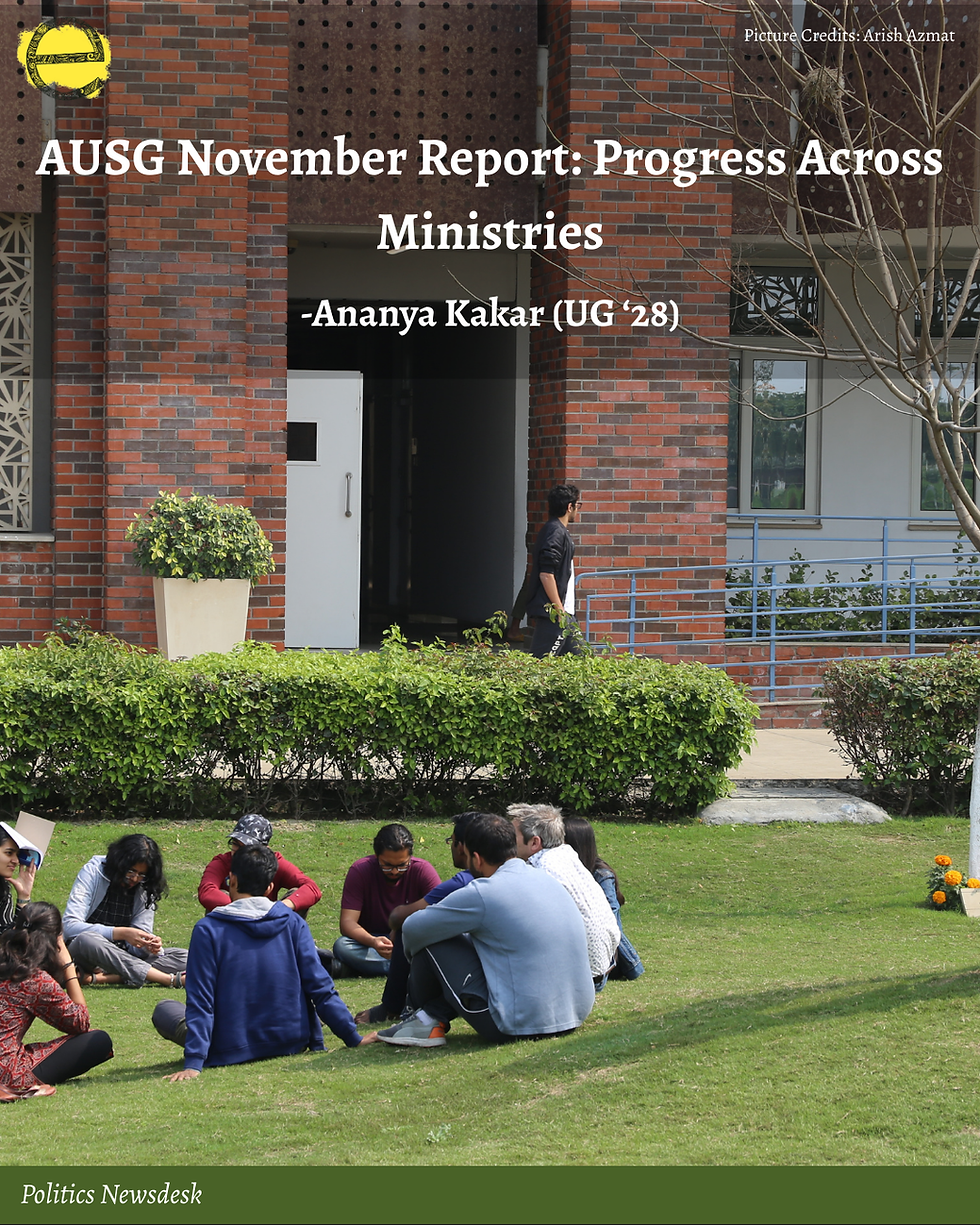Beyond Parties and Platforms: An Interview with Pratham Arora
- The Edict
- Apr 13, 2023
- 4 min read
Updated: Jun 27, 2024
Aneesh Sriram, UG25
“I did not feel it would be honest to my campaign if I ran with a party” says Pratham Arora (Independent).
As the student elections are around the corner, the Edict reached out for an interview with independent candidate Pratham Arora, who announced his candidacy for president, in a mail to the student body. The interview was centered around issues faced by Ashokans, the candidate’s plans if elected, and addressing recent events pertaining to the elections.
On the lack of student involvement
The Edict began by asking the candidate’s to plan to address the concerns about the lack of a Student Government and how he would address, what he and others at the Democracy Collective’s protest described as the one-sided decision making of the administration.
Addressing either of the issues is not a difficult matter, he insisted, and in order to have a student government that is functioning and respected, student involvement in politics should be honest and transparent. Arora said that if there are a lot of people who show up to vote for elections and attend open meetings that are happening - like it was previously in the Ashokan culture before the lock down - issues will be addressed by the admin only through a collective voice of the student body. In addition he does agree that that admin is involved in some one sided decision making but also holds that some of them also have a good rationale going behind them. “People in the admin, if questioned by the SG, do care and do reply to some emails and do mess up sometimes. Asking is a good first step”
On political parties
Being an independent candidate, Arora repeated that Ashokan student politics are not made for parties. One of the rationale behind this reasoning provided is the lack of significant ideological difference in what any party is saying.
Another reason he provides is the added layer of bureaucracy parties bring. He pointed out that the CDC was a four member body out of which two were the founding members of the Leher, and believed that there is a conflict of interest. Ultimately, “I did not feel it would be honest to my campaign if I ran with a party”. In relation to this, he has also revealed that he has not chosen a running mate for his presidential campaign and is actively looking for one, from the junior batches.
On inclusiveness
Inclusion and diversity is a crucial ideal for Ashoka. Pratham recognised the representation related issues such as Trans housing in Ashoka even if it sells itself as an inclusive space. “Another problem barely addressed in the body is the students on exceptional financial aid”, he said, citing the fact that students on aid are not allowed to bill more than 400 rupees on their mess card a day. In addition, as they are on exceptional aid, they might not have the option either to go to different outlets. It is these policies with disproportianate effects that his campaign seeks to address.
One of the key problems, he says, in underlying all these issues is the mindset of the students who do not consider Ashoka to be our own space. One of the reasons for this is Ashoka being run like a startup or a business, he says. “This is a university which admits students based on extra-curricular activities too, it seems like these decisions are not being thought through” Pratham adds on. He mentions the issue of the performing arts clubs not being able to use the Reddy’s Auditorium as they were denied access by the administration.
On student participation
The candidate recognised a general lack of participation in and around student issues from the student-population at large.
He attributed the lack of participation to the lockdown that had cut off the new students from the senior and junior batches, and they had no context about how a student government is run. Additionally, being part of the SG had become "uncool" for some students. To encourage participation, he has created a group chat on WhatsApp for independent candidates who were considering running. They were encouraged to ask questions about the problems in Ashoka and get involved in the SG.
He aims, he said, to integrate successful elements from previous SGs into the upcoming one and address common issues first to build trust with the students. Once that is achieved, the SG could focus on deeper issues such as worker welfare, trans rights, and other issues not that are not usually talked about in mainstream student discourse.
New constitution, old problems?
For the upcoming election, the new constitution is being put to use, and there were concerns about how to address constitutional issues without precedence. “I do not think a constitution can be made perfectly. For example, needing a running mate does pose problems for independents who want to contest” he said, but believed that individuals or parties who were running wanted a functioning Student Government to start with. They would be willing to make compromises to achieve this goal.
This is the first installment of the Election nterview series, where The Edict’s writers speak to relevant parties to shed light on the elections of Spring 2023.







Comments